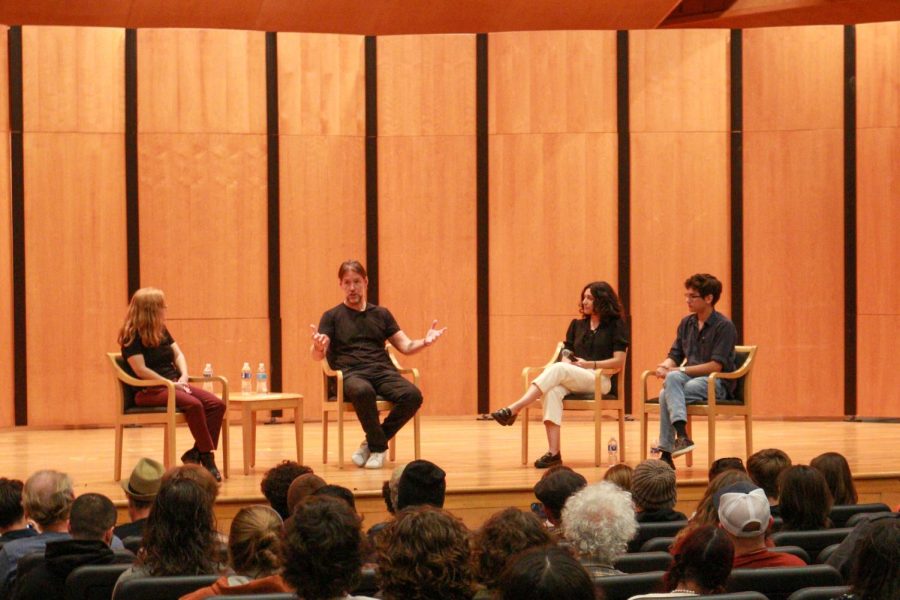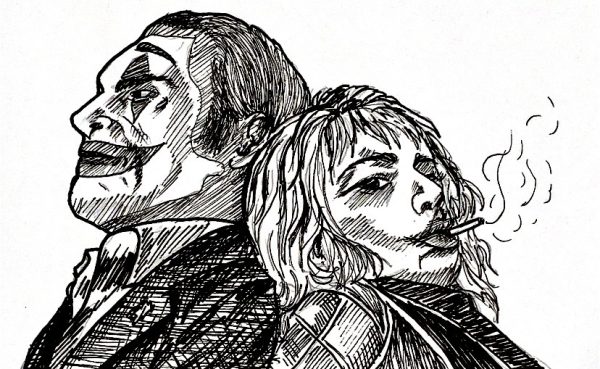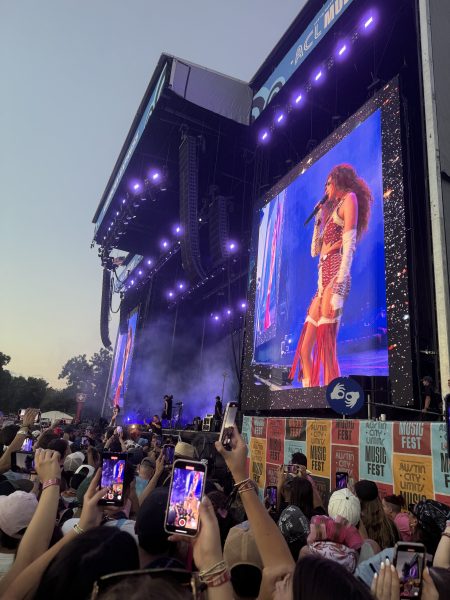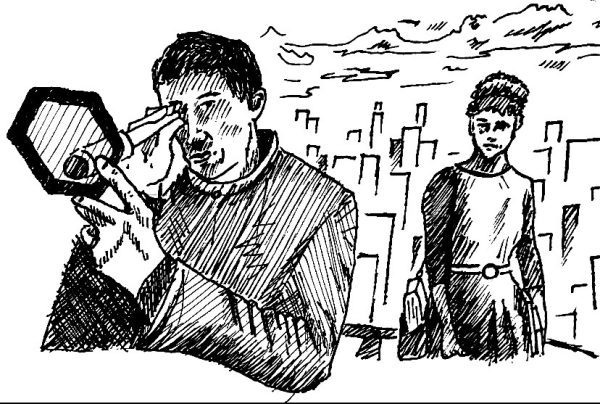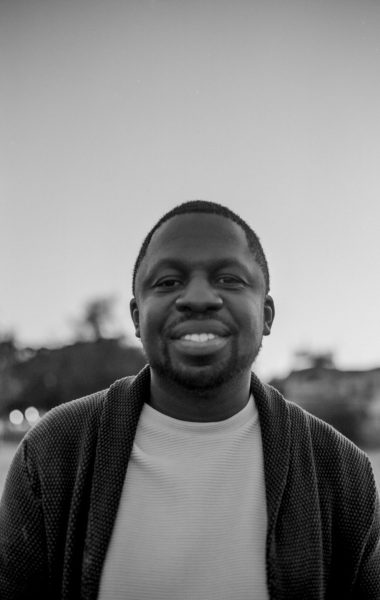Radiohead guitarist Ed O’Brien visits Trinity
O’Brien speaks about creativity in music event sponsored by Creative Genius FYE
Left to Right: Dr. Camille Reyes, Ed O’Brien, Yvanna Gonzalez, Samuel Damon
As Ed O’Brien climbed the stage at Ruth Taylor Recital Hall, he was met with thunderous applause. O’Brien flew in from London the week before Halloween on behalf of the Creative Genius First-Year Experience (FYE) to visit San Antonio, check out the university and participate in an exclusive interview with the Trinitonian, as well as an informal Q&A session moderated by Trinity students and faculty at Ruth Taylor Recital Hall on Oct. 28.
The students’ enthusiastic reaction to his arrival was warranted: from songs like “Creep” to albums like “OK Computer,” Radiohead’s impact on creative culture was significant and far-reaching in the ‘90s and continues to be so today. Ellie Gunnin, a first-year communications major and event speaker, expressed her hopes for the event.
“I’m really interested to see what his creative process is, sort of in the real world and the context of what we’re interested in, but also, you know, academically the things that we’ve been looking at,” Gunnin said.
During the Q&A, O’Brien fulfilled these hopes and more by answering several key questions on the creative process regarding intuition, inspiration and creative “hubs,” and discussing his past creative endeavors.
It takes more than inspiration to make it as an artist, though. Creativity requires self-discipline, which comes from building strict habits. As O’Brien explained, there are practical ways in which creativity and the “gut instinct” can be nurtured, and these habits are incredibly important in his daily life.
“I like, for instance, on a Sunday night, setting your intentions,” O’Brien said. “What’s the week ahead? What are you going to work on? Having focus rather than drifting.”
In addition to setting intentions, putting aside distractions is important. One thing that has been important to O’Brien is turning off his phone.
“Turning off your phone with a creative habit is massive because you don’t want to get distracted while you’re in the flow,” O’Brien said. “You’re in the flow, but if you have people texting, or checking that email, it interrupts the flow.”
The curriculum in the Creative Genius FYE teaches “flow” through concepts explained in Steven Johnson’s book Where Good Ideas Come From. Concepts like serendipity, the liquid network, and the adjacent possible are used to explain the habits that foster creativity. One of these habits, the text says, is to surround oneself with creatives.
During the talk, O’Brien incorporated this concept by discussing the importance of “hub” cities — places where creatives abound in large numbers, exchange ideas and show off their work. For O’Brien, the “hub” was Manchester City.
“It’s a smaller city, but it has this amazing musical pedigree,” O’Brien said. “I knew that [in] Manchester, you’d get all the gigs.”
Being surrounded by creativity is an essential part of the process, but collaboration alone won’t complete the project. The artistic journey requires a certain ability to trust in oneself, O’Brien explained.
“The reason I was [in Manchester] was because I followed my intuition and that gut feeling. … If I would say one thing to all of you, that is the most important thing, I think, [about] being an artist, is following your gut instinct. Because your gut instinct will give you the truth.”
Bringing O’Brien to San Antonio was an endeavor originally taken on by Paul McGinlay, men’s head soccer coach, who scouted O’Brien’s son for the Trinity soccer team. McGinlay is close with Dr. Tingle, Q&A facilitator and professor for the Creative Genius First-Year Experience program, who wanted Creative Genius students to experience and understand the process behind Radiohead’s music and be able to apply it to more than music-making. Connecting with O’Brien was a lightbulb moment for Tingle.
“As he was talking, it was like, ‘Oh my gosh, this is the perfect thing for our Creative Genius students,’” Tingle said. “Because here’s someone, that was born in 1968, who has been to the mountaintop [and] from an entertainer standpoint, is still wildly successful. But also is so grounded.”
At the end of the Q&A, Trinity students and faculty expressed gratitude for an event that had been quickly planned and executed by Trinity.
“This really is how creativity can come about,” Gunnin said. “I think seeing an example of how people are creating for themselves might inspire people in a classroom setting too.”
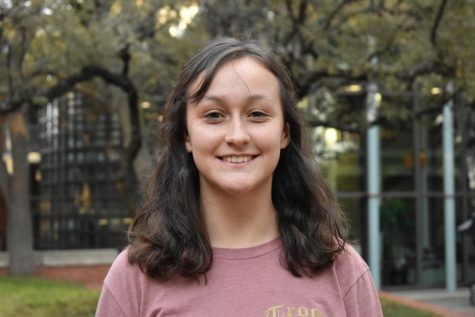
I’m Madison, and I report for the Arts and Entertainment section. I’m from Wichita Falls, Texas, and I’m a sophomore majoring in Communications with...
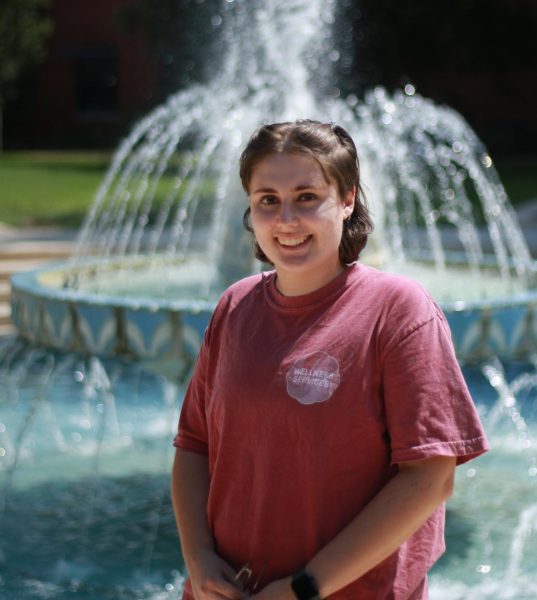
Hi! I am a junior sociology major with a double minor in gender studies and psychology. The themes for the special editions revolve around holidays and...

